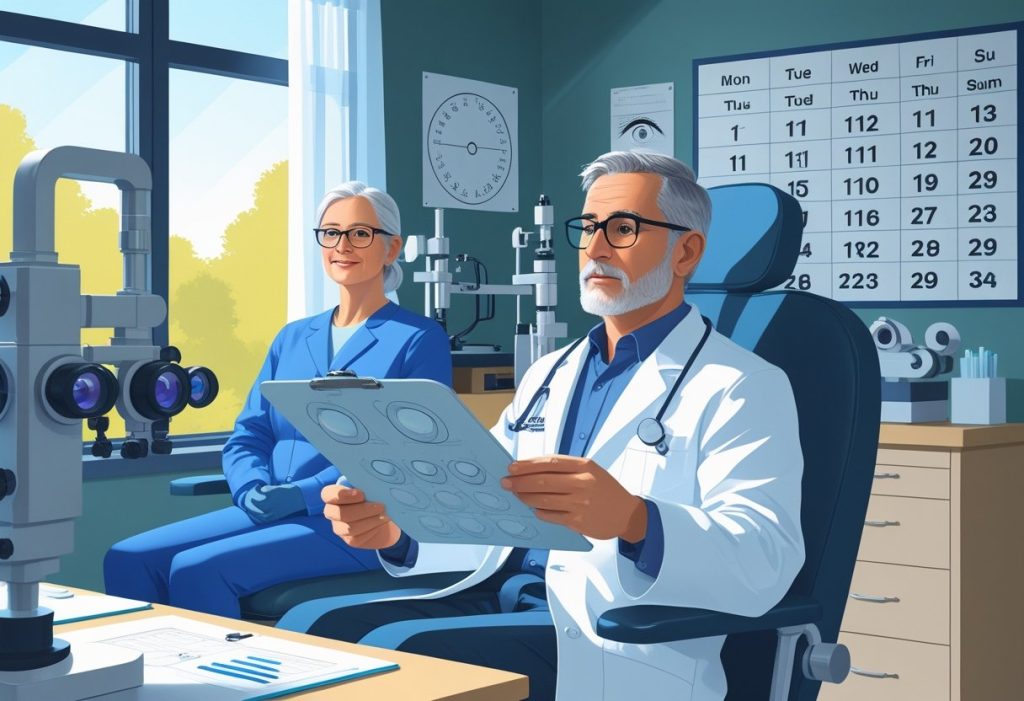Understanding how often Medicare pays for eye exams is essential for managing your healthcare expenses, especially as you age. Medicare typically does not cover routine eye exams for glasses or contacts, but it does provide coverage for specific diagnostic exams related to medical conditions. This nuance can significantly affect your overall vision care strategy.
Navigating Medicare’s vision coverage can feel overwhelming, but you’re not alone in this process. At The Modern Medicare Agency, our licensed agents are real people you can consult one-on-one. They will help you identify Medicare packages tailored to your needs without any extra fees that could strain your budget.
By exploring the ins and outs of Medicare’s eye exam coverage, you’ll be better equipped to make informed decisions about your eye health. Stay tuned to uncover more details about when and how you can benefit from Medicare’s eye care provisions.
How Often Does Medicare Pay for Eye Exams?
Understanding how frequently Medicare covers eye exams can help you manage your vision care effectively. Coverage varies based on specific conditions and the type of eye exam being conducted.
Frequency of Covered Eye Exams
Medicare provides coverage for certain eye exams depending on medical necessity. For patients at high risk for glaucoma, such as those with diabetes or a family history, Medicare covers an eye exam every 12 months. For most other conditions, coverage is typically provided once every 24 months.
If you require diagnostic tests for specific medical issues, those would also be covered under Medicare Part B. It’s essential to know the specific requirements to avoid unexpected expenses.
Medical vs. Routine Eye Exams
Medicare distinguishes between routine and medical eye exams. Routine eye exams, which are typically for eyeglasses or contact lens fittings, are not covered under Medicare. These exams are considered preventive rather than medically necessary.
In contrast, medical eye exams are covered when they are related to diagnosing or monitoring diseases such as glaucoma, cataracts, or diabetic retinopathy. You’ll want to ensure that your eye exam aligns with these criteria for coverage to apply.
Role of Medical Necessity
Medical necessity plays a crucial role in determining coverage under Medicare. If your doctor supports that an eye exam is essential for managing a specific medical condition, Medicare is more likely to cover the cost.
Conditions like diabetes and macular degeneration are central to this coverage. You should keep thorough records of any visual symptoms and treatments, as this documentation helps establish the need for eye exams.
To navigate these complexities, consider working with The Modern Medicare Agency. Our licensed agents can provide you with personalized assistance to find Medicare packages suited to your specific vision care needs without incurring extra fees.
Medicare Part B Coverage for Eye Exams
Medicare Part B provides essential coverage for specific eye exams that are medically necessary. Understanding the nuances of this coverage can help you make informed decisions about your vision care.
Glaucoma Tests and Eligibility
Medicare Part B covers glaucoma tests for individuals at high risk. This includes people aged 50 and older, those with a family history of glaucoma, and certain ethnic groups such as African Americans. You’re eligible for one glaucoma test each year. The test evaluates the pressure inside your eyes, which is crucial for early detection. Ensure you visit a Medicare-approved ophthalmologist to qualify for coverage. Remember, you may need to meet your Part B deductible before Medicare contributes to the cost. The amount covered aligns with the Medicare-approved amount, limiting out-of-pocket expenses for the necessary tests.
Diabetic Retinopathy Screening
If you have diabetes, Medicare Part B pays for an annual eye exam specifically to check for diabetic retinopathy. This condition can lead to severe vision loss if not monitored. The screening includes a comprehensive dilated exam, which is critical for assessing any changes in your vision. You must have diabetes documented in your medical records to qualify for this coverage. Regular screenings can help catch issues early, making this coverage particularly valuable for maintaining your eye health. Engage with a certified eye doctor to facilitate this process, ensuring all procedures are accounted for under your Medicare benefits.
Coverage for Age-Related Macular Degeneration
Medicare Part B covers certain treatments related to age-related macular degeneration (AMD) when deemed medically necessary. If you receive an injection or treatment for wet AMD, Medicare’s coverage will often apply. Regular assessments by a qualified eye care provider can lead to earlier interventions, which can significantly impact your quality of life. While routine eye exams are not covered, specific tests or treatments for AMD are eligible under Medicare guidelines. Be aware of the Medicare-approved amount for these procedures, as this determines your financial responsibility after deductibles.
Vision Exams Before Cataract Surgery
Before undergoing cataract surgery, a thorough eye exam is required to assess your condition. Medicare Part B covers examinations that review the eye’s health and determine the appropriate surgical approach. This includes evaluating vision clarity and assessing any related issues such as diabetic retinopathy or glaucoma. You must ensure the provider is Medicare-approved to qualify for coverage. Remember, while the exam itself is covered, Medicare will not contribute to routine eye care needs, such as glasses or contact lenses post-surgery. Prioritize discussing coverage details with your healthcare provider to ensure your vision needs are fully met.
Choosing Medicare coverage can be complex. At The Modern Medicare Agency, our licensed agents can assist you in navigating your Medicare options. We connect you with plans tailored to your unique needs, providing personal service without hidden fees.
Medicare Advantage and Additional Vision Benefits
Medicare Advantage plans, also known as Part C, offer additional vision benefits that can be valuable for your eye care needs. Understanding what these plans encompass is essential for maximizing your coverage, particularly for routine vision care and corrective lenses.
Routine Vision Care in Medicare Advantage Plans
Many Medicare Advantage plans provide coverage for routine vision care, which is typically not included in Original Medicare. This can include regular eye exams, which help in monitoring and maintaining eye health. While Original Medicare focuses on medical conditions, Medicare Advantage plans often cover preventive exams.
Check with your specific plan to confirm what types of routine services are available. Coverage can vary significantly between plans. These checks help you understand the frequency of eye exams covered and any associated co-payments.
Coverage for Eyeglasses and Contact Lenses
Some Medicare Advantage plans extend their benefits to include coverage for eyeglasses and contact lenses. This is a vital aspect for those who require vision correction.
Typically, plans might cover a portion of the costs, leading to reduced out-of-pocket expenses. They can also include allowances for frames and lenses or copays for contact lenses. Make sure to review your plan details to see the specific coverage limits and requirements.
Plan Differences and Enrollment Considerations
When selecting a Medicare Advantage plan, differences in coverage of vision benefits can be substantial. Some plans may offer extensive vision coverage, while others might have minimal options.
Considerations during enrollment should include the specific benefits offered and potential costs, such as premiums and deductibles. Evaluating the plans with a knowledgeable agent from The Modern Medicare Agency can simplify this process. Our licensed agents work one-on-one with you to tailor a plan that meets your vision needs without unexpected charges.
Make sure to engage with your Medicare resources effectively, so you can select the best option for your eye health.
Costs and Limitations of Medicare Eye Exam Coverage
Understanding the costs associated with Medicare eye exam coverage is crucial. Various factors like out-of-pocket expenses, Medicare-approved charges, and what is not covered can significantly impact your healthcare budget.
Out-of-Pocket Costs and Deductibles
Medicare Part B typically requires you to pay a deductible before coverage kicks in. As of 2025, this deductible is $233. After you meet this amount, Part B generally covers 80% of the Medicare-approved amount for eye exams related to specific medical conditions, such as diabetes or glaucoma.
You will bear the remaining 20%, plus any applicable copayments for outpatient services. If the eye exam is performed in a hospital outpatient setting, additional fees may apply, increasing your total out-of-pocket costs. Keep in mind that Original Medicare does not cover routine eye exams for corrective eyewear.
Understanding Medicare-Approved Charges
Medicare-approved amounts vary depending on the service and geographic location. When you receive an eye exam, the costs may exceed what Medicare considers reasonable. It’s important to confirm these charges, as you may be responsible for the difference if the provider’s fees are higher than the Medicare-approved amount.
Sometimes, your private insurance or supplemental plans may cover the additional expenses. Always check with your provider to understand how much of the cost Medicare will cover and what you’ll need to pay.
What Is Not Covered
Original Medicare has specific limitations regarding what services it will pay for. Routine eye exams for glasses or contact lenses are not covered under Medicare. Additionally, if no underlying medical condition prompts the exam, it will generally be your responsibility to pay full price.
Costs for corrective eyewear, such as glasses or contacts, are often not included in your Medicare benefits. Having a supplemental insurance plan may help in covering these expenses. For personalized guidance tailored to your needs, consider reaching out to The Modern Medicare Agency. Our licensed agents provide one-on-one assistance to identify Medicare packages that meet your requirements without unexpected fees.
Eye Health and Preventive Care Recommendations
Maintaining eye health is essential for preserving your vision and overall well-being. Regular eye exams and preventive measures can significantly reduce the risk of vision loss, especially as you age. Understanding these key aspects can help you take charge of your eye care.
Importance of Regular Eye Exams
Scheduling regular eye exams is vital for detecting potential issues early. These exams can identify conditions such as cataracts, glaucoma, and diabetic retinopathy before they lead to serious vision loss.
Typically, adults should have comprehensive eye exams every one to two years. If you have existing conditions or risk factors, your doctor may recommend more frequent visits. Additionally, during these exams, your eye care professional can assess your eye health, update your prescription, and provide guidance on maintaining clear vision.
Preventing Vision Loss in Older Adults
Preventing vision loss involves a multifaceted approach. It’s crucial to adopt a healthy lifestyle by maintaining a balanced diet rich in vitamins A, C, and E, as well as omega-3 fatty acids. Foods such as leafy greens, carrots, and fish contribute to long-term eye health.
Another effective strategy is protecting your eyes from harmful UV rays by wearing sunglasses outdoors. Additionally, managing chronic conditions like diabetes and hypertension can help prevent damage to your eyesight. Engaging in regular physical activity enhances overall health, which also supports eye health.
Resources for Additional Vision Support
Accessing resources for vision care is essential for strengthening your eye health knowledge. The Modern Medicare Agency offers tailored guidance on Medicare plans that cover necessary eye care services, ensuring you’re not left in the dark.
You can also explore online resources, such as government health websites and organizations dedicated to vision issues, which provide valuable information on eye health. Local support groups and community health centers can connect you with professionals who can help you navigate your eye care options more effectively.
Frequently Asked Questions
Understanding Medicare’s vision coverage can be complex. Here are some specific points regarding eye exams and related vision services under Medicare.
What vision coverage does Medicare provide for seniors?
Original Medicare, including Parts A and B, typically does not cover routine eye exams. However, Medicare Part B does cover eye exams for individuals with certain medical conditions, such as diabetes or high risk for glaucoma.
Will Medicare cover the cost of eye exams for those diagnosed with cataracts?
Medicare will cover eye exams for cataract surgery. This includes a pre-operative eye exam to assess your vision and confirm the need for surgery. Routine exams, however, are not included unless specific medical requirements are met.
How does Medicare Part B coverage apply to routine eye exams?
Medicare Part B generally does not cover routine vision care, including standard eye exams. Coverage exists for annual eye exams if you are diabetic or at high risk for glaucoma, allowing you to monitor related vision complications.
Are eyeglasses and contacts included in Medicare’s vision benefits?
Original Medicare does not cover the cost of glasses or contact lenses. If you have had cataract surgery, Medicare may cover some costs associated with corrective lenses, but routine vision correction items are excluded.
What vision benefits are available under Medicare Advantage plans?
Medicare Advantage plans often include additional vision benefits, such as coverage for routine eye exams and discounts on eyewear. The specifics vary by plan, so reviewing your options is essential to find the best fit for your needs.
Does Medicare offer coverage for eye exams related to glaucoma?
Medicare covers eye exams for glaucoma testing once every 12 months for high-risk individuals. This includes those with a family history of glaucoma or other risk factors, ensuring that you receive necessary monitoring and preventative care.
For personalized assistance with your Medicare needs, consider The Modern Medicare Agency. Our licensed agents will work with you one-on-one to identify the best Medicare packages tailored to your requirements, all without hidden fees.






